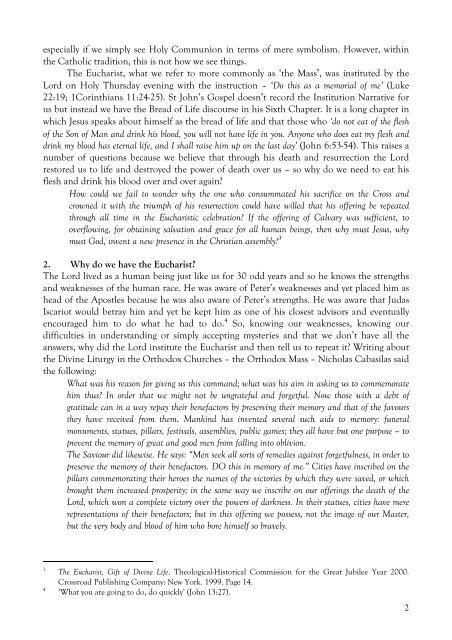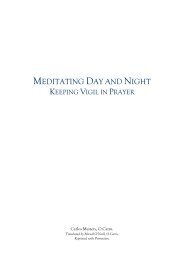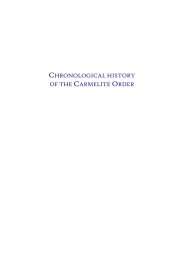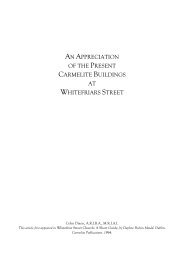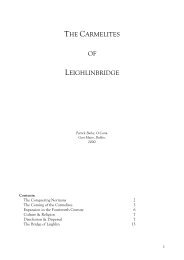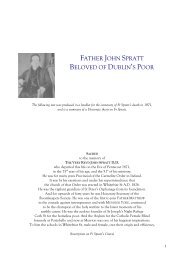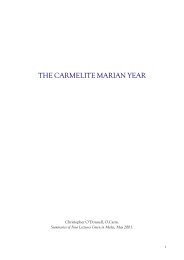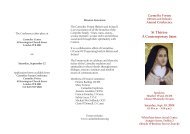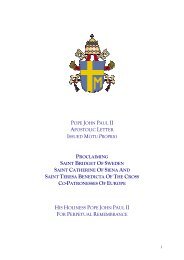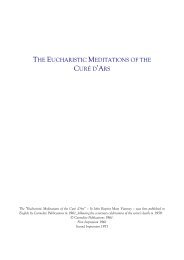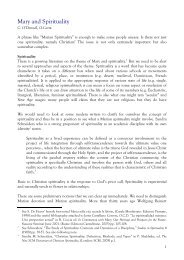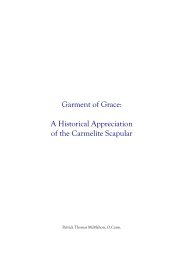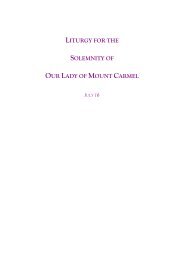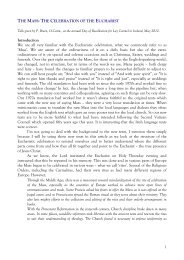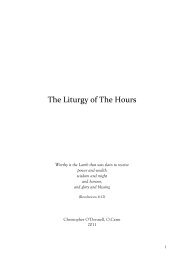THE EUCHARIST Introduction For all of us here, when we talk about ...
THE EUCHARIST Introduction For all of us here, when we talk about ...
THE EUCHARIST Introduction For all of us here, when we talk about ...
Create successful ePaper yourself
Turn your PDF publications into a flip-book with our unique Google optimized e-Paper software.
especi<strong>all</strong>y if <strong>we</strong> simply see Holy Communion in terms <strong>of</strong> mere symbolism. Ho<strong>we</strong>ver, within<br />
the Catholic tradition, this is not how <strong>we</strong> see things.<br />
The Eucharist, what <strong>we</strong> refer to more commonly as ‘the Mass’, was instituted by the<br />
Lord on Holy Thursday evening with the instruction – ‘Do this as a memorial <strong>of</strong> me’ (Luke<br />
22:19; 1Corinthians 11:24-25). St John’s Gospel doesn’t record the Institution Narrative for<br />
<strong>us</strong> but instead <strong>we</strong> have the Bread <strong>of</strong> Life discourse in his Sixth Chapter. It is a long chapter in<br />
which Jes<strong>us</strong> speaks <strong>about</strong> himself as the bread <strong>of</strong> life and that those who ‘do not eat <strong>of</strong> the flesh<br />
<strong>of</strong> the Son <strong>of</strong> Man and drink his blood, you will not have life in you. Anyone who does eat my flesh and<br />
drink my blood has eternal life, and I sh<strong>all</strong> raise him up on the last day’ (John 6:53-54). This raises a<br />
number <strong>of</strong> questions beca<strong>us</strong>e <strong>we</strong> believe that through his death and resurrection the Lord<br />
restored <strong>us</strong> to life and destroyed the po<strong>we</strong>r <strong>of</strong> death over <strong>us</strong> – so why do <strong>we</strong> need to eat his<br />
flesh and drink his blood over and over again?<br />
How could <strong>we</strong> fail to wonder why the one who consummated his sacrifice on the Cross and<br />
crowned it with the triumph <strong>of</strong> his resurrection could have willed that his <strong>of</strong>fering be repeated<br />
through <strong>all</strong> time in the Eucharistic celebration? If the <strong>of</strong>fering <strong>of</strong> Calvary was sufficient, to<br />
overflowing, for obtaining salvation and grace for <strong>all</strong> human beings, then why m<strong>us</strong>t Jes<strong>us</strong>, why<br />
m<strong>us</strong>t God, invent a new presence in the Christian assembly? 3<br />
2. Why do <strong>we</strong> have the Eucharist?<br />
The Lord lived as a human being j<strong>us</strong>t like <strong>us</strong> for 30 odd years and so he knows the strengths<br />
and <strong>we</strong>aknesses <strong>of</strong> the human race. He was aware <strong>of</strong> Peter’s <strong>we</strong>aknesses and yet placed him as<br />
head <strong>of</strong> the Apostles beca<strong>us</strong>e he was also aware <strong>of</strong> Peter’s strengths. He was aware that Judas<br />
Iscariot would betray him and yet he kept him as one <strong>of</strong> his closest advisors and eventu<strong>all</strong>y<br />
encouraged him to do what he had to do. 4 So, knowing our <strong>we</strong>aknesses, knowing our<br />
difficulties in understanding or simply accepting mysteries and that <strong>we</strong> don’t have <strong>all</strong> the<br />
ans<strong>we</strong>rs, why did the Lord institute the Eucharist and then tell <strong>us</strong> to repeat it? Writing <strong>about</strong><br />
the Divine Liturgy in the Orthodox Churches – the Orthodox Mass – Nicholas Cabasilas said<br />
the following:<br />
What was his reason for giving <strong>us</strong> this command; what was his aim in asking <strong>us</strong> to commemorate<br />
him th<strong>us</strong>? In order that <strong>we</strong> might not be ungrateful and forgetful. Now those with a debt <strong>of</strong><br />
gratitude can in a way repay their benefactors by preserving their memory and that <strong>of</strong> the favours<br />
they have received from them. Mankind has invented several such aids to memory: funeral<br />
monuments, statues, pillars, festivals, assemblies, public games; they <strong>all</strong> have but one purpose – to<br />
prevent the memory <strong>of</strong> great and good men from f<strong>all</strong>ing into oblivion.<br />
The Saviour did likewise. He says: “Men seek <strong>all</strong> sorts <strong>of</strong> remedies against forgetfulness, in order to<br />
preserve the memory <strong>of</strong> their benefactors. DO this in memory <strong>of</strong> me.” Cities have inscribed on the<br />
pillars commemorating their heroes the names <strong>of</strong> the victories by which they <strong>we</strong>re saved, or which<br />
brought them increased prosperity; in the same way <strong>we</strong> inscribe on our <strong>of</strong>ferings the death <strong>of</strong> the<br />
Lord, which won a complete victory over the po<strong>we</strong>rs <strong>of</strong> darkness. In their statues, cities have mere<br />
representations <strong>of</strong> their benefactors; but in this <strong>of</strong>fering <strong>we</strong> possess, not the image <strong>of</strong> our Master,<br />
but the very body and blood <strong>of</strong> him who bore himself so bravely.<br />
3<br />
4<br />
The Eucharist, Gift <strong>of</strong> Divine Life. Theological-Historical Commission for the Great Jubilee Year 2000.<br />
Crossroad Publishing Company: New York. 1999. Page 14.<br />
‘What you are going to do, do quickly’ (John 13:27).<br />
2


